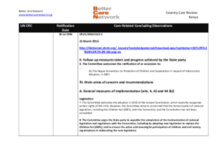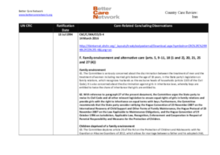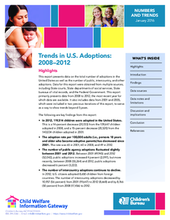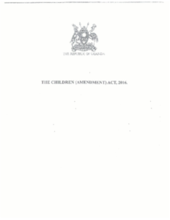Displaying 381 - 390 of 623
This country care review includes the care related Concluding Observations adopted by the Committee on the Rights of the Child and the Committee on the Rights of Persons with Disabilities.
This country care review includes the care-related Concluding Observations adopted by the Committee on the Rights of the Child.
This country care review includes the care-related Concluding Observations adopted by the Committee on the Rights of the Child.
Child Trends recently released three sets of child welfare fact sheets detailing child maltreatment, foster care, and adoption statistics from the United States for federal fiscal year (FFY) 2013. Each set of 52 fact sheets uses state and national data to tell a story about the U.S.'s most vulnerable children and youth, a story that varies dramatically by state.
This study examined stress, coping and psychological adjustment of 68 children, aged 8–12, who were internationally adopted to Spain.
This video by Child's i Foundation in Uganda document's the journey of a little girl, Praise, from being abandoned to being placed into to a permanent family. The video shows the tracing process and temporary placement with a foster carer, Ruth.
Through a study of the legal frameworks and court decisions of Malawi and Uganda, this article demonstrates that some of the most common restrictions on inter-country adoption do not serve the best interests and rights of the child.
This report presents data on the total number of adoptions in the United States as well as the number of public, intercountry, and other adoptions covering 2008 to 2012.
This article begins by summarizing the scholarly literature on the "Sixties Scoop," a period in Canadian history in which an estimated 20,000 First Nations, Metis, and Inuit children were removed from their families, and describes a proposed theoretical framework of Indigenous adoptee identity reclamation emerging from my reflexive process in writing a critical personal narrative.
The Children (Amendment) Act of 2016 is an Act to amend the Children's Act Cap. 59 of Uganda to enhance the protection of children; to strengthen the provision for guardianship of children; to strengthen the conditions for intercountry adoption; to prohibit corporal punishment; to provide for the National Children Authority; repeal the National Council for Children Cap. 60 and to provide for other related matters.






